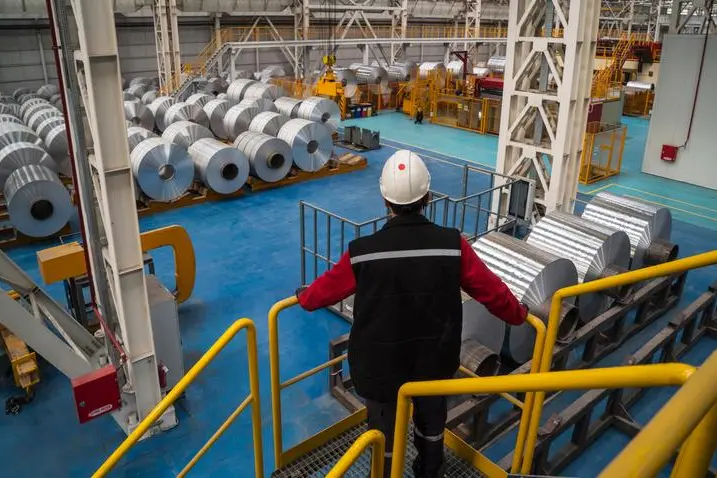PHOTO
Singapore and Qatar are joining forces to leverage technology and support initiatives that ensure effective and transparent carbon footprint accounting especially in heavy industries like the aluminium industry.
The Ministry of Environment, Qatar, is at the forefront of this technology exchange with Singapore, further innovating to accelerate progress. Companies like #dltledgers from Singapore are instrumental in this endeavour, providing the necessary technological framework to facilitate these goals through joint collaboration.
The Gulf Cooperation Council (GCC) countries, including Qatar, play a pivotal role in global aluminium production, contributing around 10% of the world's aluminium demand and exporting 60% of their production to over 65 countries. Qatar's commitment to sustainability is evident through initiatives led by its Ministry of Environment and Climate Change (MoECC).
Setting a precedent
The governments of Singapore and Qatar are collaborating to enhance carbon footprint accounting in the aluminium industry. Enterprise Singapore (ESG) and MoECC are spearheading efforts to implement cutting-edge technologies and frameworks to achieve this goal. These initiatives not only support the aluminium sector but also set a precedent for other industries to follow.
The aluminium industry is a significant emitter of CO2, accounting for more than 1.1 billion tonnes of CO2e emissions annually, or about 2% of global anthropogenic emissions. With the projected increase in aluminium demand, it is imperative to address these emissions to limit global warming to 1.5°C. The decarbonisation of the aluminium industry requires a multifaceted approach, focusing on three key areas: the decarbonisation of electricity consumption, direct emissions from aluminium processing, and the recycling of aluminium scrap.
Decarbonising electricity consumption involves transitioning to renewable energy sources and implementing carbon capture, utilisation, and storage (CCUS) technologies. Addressing direct emissions includes developing technologies that provide heat and steam without fossil fuels and creating non-carbon anodes. Recycling aluminium scrap is crucial as it requires only 5% of the energy needed for primary aluminium production, significantly reducing carbon emissions.
Collaboration across value chain
Successful decarbonisation of the aluminium industry depends on collaboration across the value chain, from suppliers to customers. Research and development in areas like inert anode technology, CCUS applications, and improved scrap collection methods are crucial. Moreover, industry players must work closely with power providers to support the transition to renewable energy sources.
In Qatar, the MoECC, along with the Qatar Industrial Manufacturing Company (QIMC), is exploring innovative solutions to decarbonise the aluminium sector. This initiative aims to inspire the industry, its suppliers, and customers to address decarbonisation challenges proactively and collaboratively.
By sharing industry-specific examples and potential pathways for impact, Qatar's efforts highlight the importance of collective action in reducing the sector's carbon footprint.
Companies like #dltledgers are at the forefront of providing technological solutions to support these governmental initiatives. #dltledgers addresses source-level coordination, collaboration, and multi-user participation with verifiable audit trails, ensuring compliance with regulations for reducing carbon footprints. Its Proteus framework offers authentic visibility into corporate and product carbon footprints, facilitating accurate and auditable records for all involved parties, thereby aiding in tracking and reducing carbon footprints.
Driving innovation
Nada Al-Olaqi, RDI Programme Director of the Qatar Research, Development, and Innovation (QRDI) Council, who participated in a panel discussion during the QRDI Council engagement activities at SWITCH 2023, expressed her enthusiasm about this collaboration, saying: "We are excited to join hands with Singapore in launching the Qatar-Singapore Joint Innovation Challenge, to provide valuable opportunities for Singapore companies to offer their innovations to Qatari entities. This initiative is a testament to our commitment to driving innovation and growth for Qatar while strengthening our global partnerships."
Dr Abdullah bin Abdulaziz bin Turki Al Subaie, Qatar’s Minister of Environment and Climate Change, emphasised the country's commitment to environmental sustainability and regional cooperation. He highlighted that Qatar's active participation in international dialogues and initiatives, such as COP28, underscores its strategic role in unifying efforts to combat climate change and enhance environmental sustainability.
The collaboration between Singapore and Qatar exemplifies the global effort required to tackle carbon footprints in heavy industries. Through technological advancements and joint initiatives, these nations are paving the way for a more sustainable future.
The aluminium industry's journey towards decarbonisation is challenging but achievable through collective action and innovative solutions. As more nations join this effort, the path to a low-carbon economy becomes clearer, inspiring industries worldwide to adopt sustainable practices and technologies.
Copyright 2024 Al Hilal Publishing and Marketing Group Provided by SyndiGate Media Inc. (Syndigate.info).





















